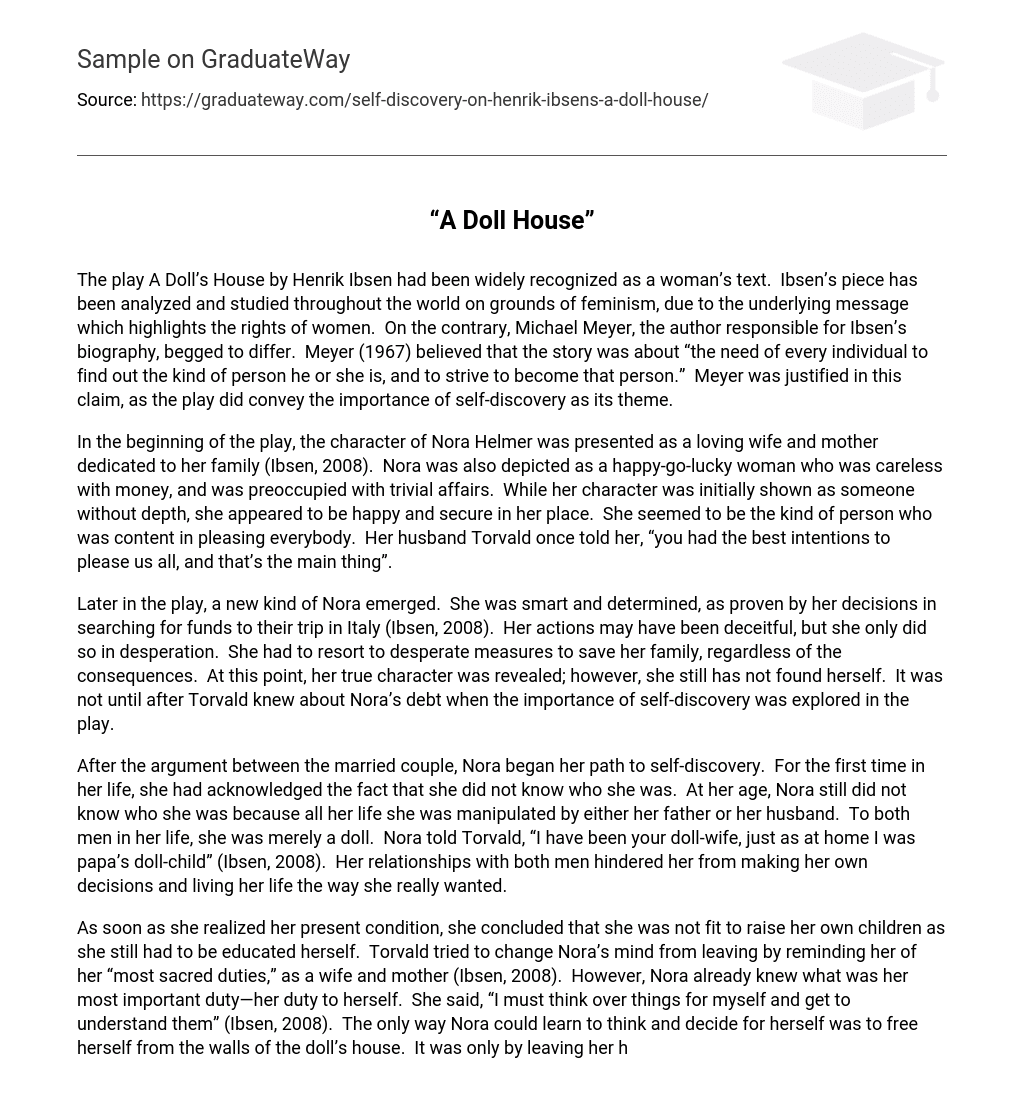The play A Doll’s House by Henrik Ibsen had been widely recognized as a woman’s text. Ibsen’s piece has been analyzed and studied throughout the world on grounds of feminism, due to the underlying message which highlights the rights of women. On the contrary, Michael Meyer, the author responsible for Ibsen’s biography, begged to differ. Meyer (1967) believed that the story was about “the need of every individual to find out the kind of person he or she is, and to strive to become that person.” Meyer was justified in this claim, as the play did convey the importance of self-discovery as its theme.
In the beginning of the play, the character of Nora Helmer was presented as a loving wife and mother dedicated to her family (Ibsen, 2008). Nora was also depicted as a happy-go-lucky woman who was careless with money, and was preoccupied with trivial affairs. While her character was initially shown as someone without depth, she appeared to be happy and secure in her place. She seemed to be the kind of person who was content in pleasing everybody. Her husband Torvald once told her, “you had the best intentions to please us all, and that’s the main thing”.
Later in the play, a new kind of Nora emerged. She was smart and determined, as proven by her decisions in searching for funds to their trip in Italy (Ibsen, 2008). Her actions may have been deceitful, but she only did so in desperation. She had to resort to desperate measures to save her family, regardless of the consequences. At this point, her true character was revealed; however, she still has not found herself. It was not until after Torvald knew about Nora’s debt when the importance of self-discovery was explored in the play.
After the argument between the married couple, Nora began her path to self-discovery. For the first time in her life, she had acknowledged the fact that she did not know who she was. At her age, Nora still did not know who she was because all her life she was manipulated by either her father or her husband. To both men in her life, she was merely a doll. Nora told Torvald, “I have been your doll-wife, just as at home I was papa’s doll-child” (Ibsen, 2008). Her relationships with both men hindered her from making her own decisions and living her life the way she really wanted.
As soon as she realized her present condition, she concluded that she was not fit to raise her own children as she still had to be educated herself. Torvald tried to change Nora’s mind from leaving by reminding her of her “most sacred duties,” as a wife and mother (Ibsen, 2008). However, Nora already knew what was her most important duty—her duty to herself. She said, “I must think over things for myself and get to understand them” (Ibsen, 2008). The only way Nora could learn to think and decide for herself was to free herself from the walls of the doll’s house. It was only by leaving her husband and children that she can truly stop being the doll and become a “reasonable human being” for the first time.
Though highly credited for its call for women’s rights, Henrik Ibsen’s A Doll’s House should also be considered for its theme of self-discovery. Nora Helmer initially appeared to be a happy wife and mother. After a major argument with her husband, she had an epiphany and the façade was destroyed. In reality, Nora had been reduced to a living doll by the men in her life. Throughout her entire life, she was under the control of either her father or husband, both of which shaped her life according to their wishes. The argument over the debt awakened Nora, after which she recognized her need to free herself from her suffocating home life and discover the kind of person she really is.
The play placed great emphasis on the importance of self-discovery to live a prosperous existence. As in the case of Nora, a woman cannot grow in a relationship which deprived her of her own freedom; she had to break away to establish her own identity. Though she hated to neglect her own children, she knew she had to find herself before she can properly play the role of mother. Hence, Michael Meyer was right to assert that Henrik Ibsen’s A Doll’s House was about the need of an individual to discover what kind of person he or she is, as shown by Nora’s character.
References
- Ibsen, H. (2008). A Doll’s House. Retrieved March 4, 2009, from http://www.gutenberg.org/files/2542/2542.txt
- Meyer, M. (1967). Henrik Ibsen. London: Hart-Davis.





